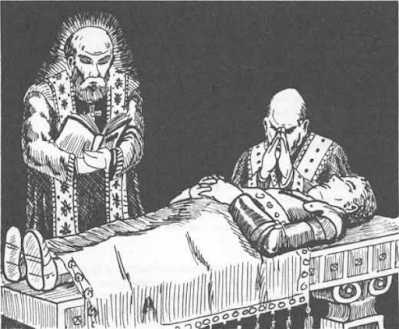Raising Questions about Raising the Dead
 In a comment to yesterday's post about my ongoing House of Worms Empire of the Petal Throne campaign, I was asked why I balked at giving player characters' access to spells like raise dead, when the game itself allows them? That's a very good question and I'm glad it was asked, because it made me explore my feelings on the matter a bit more.
In a comment to yesterday's post about my ongoing House of Worms Empire of the Petal Throne campaign, I was asked why I balked at giving player characters' access to spells like raise dead, when the game itself allows them? That's a very good question and I'm glad it was asked, because it made me explore my feelings on the matter a bit more.In original Dungeons & Dragons, raise dead is a 5th-level cleric spell, the highest level of such spells available prior to the publication of Greyhawk. The earliest a player character can gain access to this spell is 7th level (50,000 experience points). The spell is described thusly:
The Cleric simply points his finger, utters the incantation, and the dead person is raised. This spell works with men, elves, and dwarves only. For each level the Cleric has progressed beyond the 8th, the time limit for resurrection extends another four days. Thus, an 8th level Cleric can raise a body dead up to four days, a 9th level Cleric can raise a body dead up to eight days, and so on. Naturally, if the character's Constitution was weak, the spell will not bring him back to life. In any event raised characters must spend two game weeks time recuperating from the ordeal.
Greyhawk introduces two new spell levels for clerics, 6th and 7th, with the latter including the spell raise dead fully that is functionally identical to its 5th-level counterpart, except that "no rest or recuperation is required thereafter." This spell first becomes available at 17th level, which I suspect effectively put out of easy reach of most player characters.
The Empire of the Petal Throne equivalent is revivify, the highest level "priestly skill" in the game. At level 1, EPT characters begin with 2 to 5 abilities chosen from a chart. How many of these abilities an individual character gets is randomly determined, That said, revivify is available to a priest no sooner than level 8 (120,000) and no later than level 11 (440,000). Bear in mind, too, the XP penalties the game employs to slow progression, starting at level 4. This is significantly later than in OD&D by any metric.
The description of revivify is as follows:
Depending on the character's constitution (Cf. Sec. 413 above), this spell restores one slain human or intelligent nonhuman to life. A newly revived being cannot engage in fighting for a period of one week. This spell must be used within one week of the being's death; otherwise he or she cannot be revived. Usable once a week by persons of eighth level or below; usable once a day by those above eighth level.
It's fascinating to note the mechanical similarities and differences, which are no surprise, given that EPT's rules were heavily inspired by those of OD&D. What I think is most notable, though, is how much more difficult it would be for an Empire of the Petal Throne player character to gain access to revivify, compared to raise dead in Dungeons & Dragons. I suspect this is intentional, as one M.A.R. Barker's early criticisms of D&D was that the game's rules were devoid of any social context, seemingly existing in a societal vacuum. Tékumel is, in part, an answer to that perceived vacuum, grounding its mechanics in a social structure so that there are consequences and stakes to the implications of the rules.
Ultimately, I think my unease with raise dead rests somewhere in this vicinity. It's both too readily available to player characters – 50,000 XP isn't all that much in OD&D, even after the Greyhawk changes – and without any larger context. Mind you, that's a problem with D&D generally, though I understand that many, not without reason, don't see this as a problem per se but rather a kind of design agnosticism. That's fair, I think, but it does little to answer my own concerns, except perhaps to say, "If you don't like it in your campaign, change it."
In the case of the House of Worms campaign, I haven't changed anything with regard to the revivify spell. None of the priest characters in the group is yet high enough level to cast the spell. Likewise, the two instances of resurrection to occur didn't involve the spell but instead near-miraculous events outside the control of the players. Rather, they were orchestrated by me as the referee, because I saw an opportunity to use a character's death(s) to do something interesting in the campaign. That's the crux of it for me: I don't actually object to the idea of raising a character from the dead, even multiple times. What I object to is the reduction of this event to something ordinary, something that can happen at the beck and call of player characters. If a character is to rise from the dead, I want it to be special.
If that makes me a hypocrite or inconsistent, I'll own that. It certainly wouldn't be the first time I've talked out of both sides of my mouth and likely won't be the last.
James Maliszewski's Blog
- James Maliszewski's profile
- 3 followers



